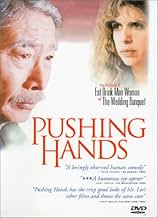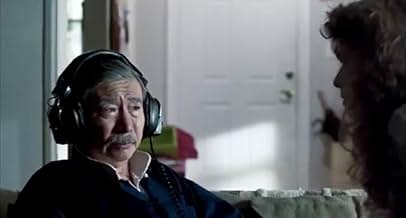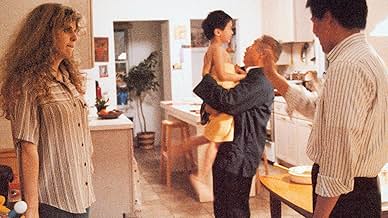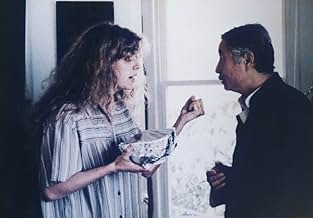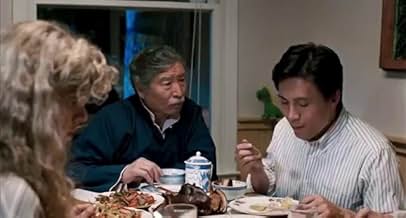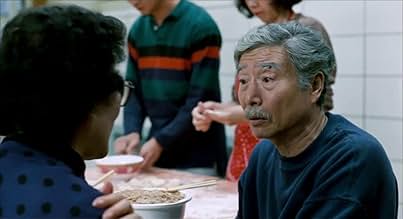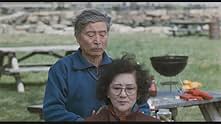ÉVALUATION IMDb
7,2/10
5,1 k
MA NOTE
Ajouter une intrigue dans votre langueAll the while, Master Chu tries to find his place in the foreign American world.All the while, Master Chu tries to find his place in the foreign American world.All the while, Master Chu tries to find his place in the foreign American world.
- Prix
- 6 victoires et 7 nominations au total
Bozhao Wang
- Alex Chu
- (as Ye-tong Wang)
Commentaire en vedette
'Pushing hands' refers to an exercise in tai chi where lightly touching each other, two practitioners learn to yield to and redirect a shared flow of energy. It's actually at the core of tai chi, a Chinese form of boxing built around Taoist principles of interconnected balance of opposites and emptiness in form.
Nearly impossible to make sense of in film, as is meditation and other internal arts of the East, because simply showing it, or worse in the light of mystical ability, obscures what it really is about. Ang Lee however tries in his first film, with mixed results.
Modeled to the story of an aging tai chi master who comes to America to stay with his son's family, there is what you'd expect from a film where East comes West; contrasts between two opposite ways of life, tradition versus modernity, love versus duty.
All that is pretty ordinary, and some obvious drama and questionable acting bring it further down. To be fair, for a low-budget student film, Lee shows considerable talent with a camera and has come far on this strength. All told, I'd rather celebrate his success story than Tarantino's. But let's see something more interesting from the Chinese perspective.
The overall point is finding a center of stillness in imbalanced life that is constantly in motion; in the film we see this in the old master's quest for a home and new life in a new country, somewhere to grow roots. This is the tao of balancing in the flow.
Life back in China isn't presented as ideal, we find that the old man has been persecuted all his life, and that his tai chi and calligraphy are the still spot he cultivates, his center in a moving universe of suffering. See how a phone ringing startles him from meditation, that is life that goes on.
In line with tai chi principles, all this means 'hard' in several moments of real life conflict, versus 'soft' in inwards reflection. There is a love interest in Mrs. Chen (soft, as feminine yin to his yang) who's in a similar situation as the old man and much gentle pushing and yielding to be close to her.
So how beautiful, if we could have the film as cinematic 'pushing hands' between lonely souls? And carry the flow from heavy drama to soft inner life, to what these people do to cool and express their ardor, she in her cooking, he in his calligraphy. Kar Wai makes it work, not quite so here.
Why is that? There's a scene of the old man watching videotapes of old Chinese kung fu movies, ridiculous from his perspective. The film is meant to offer next to other things a realistic depiction of his arts, fighting or otherwise, tied to realistic human connection as both soft.
But there are scenes like with the fat boy or in the restaurant, that in the end are as ridiculous as those movies, suddenly jerking us to fiction, obscuring what is vital in his art; and mirroring that, there's a sense of inflated drama in emotional moments. But Lee is too talented for us to be able to easily discard the whole work.
The Western perspective, introduced later in the film by the son, is that his father's internal arts may be his way of shutting off the outside world, keeping from being touched perhaps related to the tragic loss of his wife. All through the film, we see that he likes Mrs. Chen but is reluctant to be close to her.
Now watch again the last scene where he teaches tai chi in the Chinese community center, now the 'hero of Chinatown'. Watch how we first see him doing the motions, then with a soft flow of the camera materializes behind him as though out of thin air an entire class of students. And who enters as if by chance? Mrs. Chen.
Now 'soft' is what we see of his heart, 'hard' what we imagine as taking place in his head.
See how lightly the real and unreal touch, how smooth the parallel flow. So you can afford to miss the rest but not this last moment, it's expertly done and too delicious to ignore.
Nearly impossible to make sense of in film, as is meditation and other internal arts of the East, because simply showing it, or worse in the light of mystical ability, obscures what it really is about. Ang Lee however tries in his first film, with mixed results.
Modeled to the story of an aging tai chi master who comes to America to stay with his son's family, there is what you'd expect from a film where East comes West; contrasts between two opposite ways of life, tradition versus modernity, love versus duty.
All that is pretty ordinary, and some obvious drama and questionable acting bring it further down. To be fair, for a low-budget student film, Lee shows considerable talent with a camera and has come far on this strength. All told, I'd rather celebrate his success story than Tarantino's. But let's see something more interesting from the Chinese perspective.
The overall point is finding a center of stillness in imbalanced life that is constantly in motion; in the film we see this in the old master's quest for a home and new life in a new country, somewhere to grow roots. This is the tao of balancing in the flow.
Life back in China isn't presented as ideal, we find that the old man has been persecuted all his life, and that his tai chi and calligraphy are the still spot he cultivates, his center in a moving universe of suffering. See how a phone ringing startles him from meditation, that is life that goes on.
In line with tai chi principles, all this means 'hard' in several moments of real life conflict, versus 'soft' in inwards reflection. There is a love interest in Mrs. Chen (soft, as feminine yin to his yang) who's in a similar situation as the old man and much gentle pushing and yielding to be close to her.
So how beautiful, if we could have the film as cinematic 'pushing hands' between lonely souls? And carry the flow from heavy drama to soft inner life, to what these people do to cool and express their ardor, she in her cooking, he in his calligraphy. Kar Wai makes it work, not quite so here.
Why is that? There's a scene of the old man watching videotapes of old Chinese kung fu movies, ridiculous from his perspective. The film is meant to offer next to other things a realistic depiction of his arts, fighting or otherwise, tied to realistic human connection as both soft.
But there are scenes like with the fat boy or in the restaurant, that in the end are as ridiculous as those movies, suddenly jerking us to fiction, obscuring what is vital in his art; and mirroring that, there's a sense of inflated drama in emotional moments. But Lee is too talented for us to be able to easily discard the whole work.
The Western perspective, introduced later in the film by the son, is that his father's internal arts may be his way of shutting off the outside world, keeping from being touched perhaps related to the tragic loss of his wife. All through the film, we see that he likes Mrs. Chen but is reluctant to be close to her.
Now watch again the last scene where he teaches tai chi in the Chinese community center, now the 'hero of Chinatown'. Watch how we first see him doing the motions, then with a soft flow of the camera materializes behind him as though out of thin air an entire class of students. And who enters as if by chance? Mrs. Chen.
Now 'soft' is what we see of his heart, 'hard' what we imagine as taking place in his head.
See how lightly the real and unreal touch, how smooth the parallel flow. So you can afford to miss the rest but not this last moment, it's expertly done and too delicious to ignore.
- chaos-rampant
- 27 févr. 2013
- Lien permanent
Histoire
Le saviez-vous
- GaffesThe son, Alex, has physiognomy that is unmistakably that of someone Beijing, and the actor speaks with a Beijing accent, but the father, who demonstrates Taiwanese cultural practices, has the appearance of someone from farther south, such as near Shanghai. Regardless of whom the father might have married, the couple could not have produced a child with such Northern characteristics. This is a casting error more than a character error.
- ConnexionsFeatured in Century of Cinema: Naamsaang-neuiseung (1996)
Meilleurs choix
Connectez-vous pour évaluer et surveiller les recommandations personnalisées
- How long is Pushing Hands?Propulsé par Alexa
Détails
- Date de sortie
- Pays d’origine
- Langues
- Aussi connu sous le nom de
- Pushing Hands
- Lieux de tournage
- sociétés de production
- Consultez plus de crédits d'entreprise sur IMDbPro
Box-office
- Budget
- 400 000 $ US (estimation)
- Brut – États-Unis et Canada
- 152 322 $ US
- Fin de semaine d'ouverture – États-Unis et Canada
- 9 567 $ US
- 4 juin 1995
- Brut – à l'échelle mondiale
- 152 322 $ US
Contribuer à cette page
Suggérer une modification ou ajouter du contenu manquant









